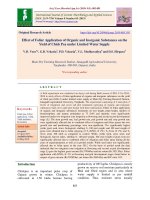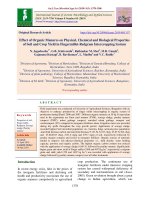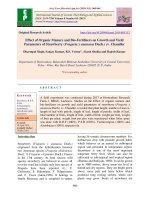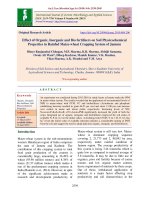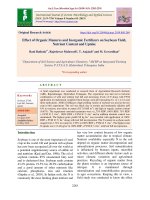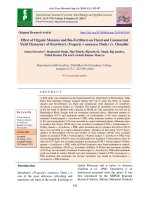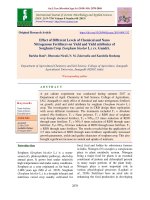Effect of organic manures and inorganic fertilizers on available nutrient status, yield and jaggery of sugarcane
Bạn đang xem bản rút gọn của tài liệu. Xem và tải ngay bản đầy đủ của tài liệu tại đây (175.86 KB, 7 trang )
Int.J.Curr.Microbiol.App.Sci (2019) 8(9): 1456-1462
International Journal of Current Microbiology and Applied Sciences
ISSN: 2319-7706 Volume 8 Number 09 (2019)
Journal homepage:
Original Research Article
/>
Effect of Organic Manures and Inorganic Fertilizers on Available Nutrient
Status, Yield and Jaggery of Sugarcane
B. Vajantha*, N. V. Sarala, M. Hemanth Kumar and M. Subba Rao
Agricultural Research Station, Perumallapalle, Acharya N. G. Ranga Agricultural University,
Andhra Pradesh, India
*Corresponding author
ABSTRACT
Keywords
Sugarcane, organic
manures, chemical
fertilizers, yield,
quality and soil
fertility.
Article Info
Accepted:
18 August 2019
Available Online:
10 September 2019
A field experiment was conducted during 2014-15 to study the impact of
continuous application of organic manures and inorganic fertilizers on cane yield,
jaggery yield, quality of sugarcane and soil fertility status after harvest at
Agricultural Research Station, Perumallapalle, ANGRAU. The experiment
consisted of two treatments i.e. organic and inorganic treatments. FYM and vermi
compost were applied to organic treated plot based on N equivalent and
recommended dose of fertilizers (224:112:112 kg NPK ha-1) were applied to
inorganic treated plot. Yield and juice quality parameters were recorded at harvest.
Soil samples were collected to determine available nutrient status at harvest.
Results revealed that cane yield, cane length, Commercial Cane Sugar (CCS) %
and CCS yield were significantly affected by organic manures and inorganic
fertilizers. The inorganic treated plot recorded higher cane yield (97.4 t ha -1), cane
length (264 cm), CCS% (12.37%) and CCS yield (11.03 t ha-1) compared with
organic treated plot (92.6 t ha-1 of cane yield, 251 cm of cane length, 12.10% of
CCS and 10.09 t ha-1 of CCS yield). However Sucrose (16.17%) was higher with
application of organic manures than inorganic treated plot (15.92%). Higher
jaggery yield (11.05 t ha-1) was recorded with inorganic treated plot than organic
plot (10.09 t ha-1). Regarding soil properties available nitrogen and potassium
were significantly higher with organic treated plot (244 and 265 kg ha -1 of
available nitrogen and potassium respectively) than inorganic plot (239 and 258 kg
ha-1 of available nitrogen and potassium respectively).
Introduction
Addition of organic manures to soil creates a
favorable environment where by crop shows a
good response to all management practices.
Level of organic matter content of soil is the
characteristic property of soil. Sugarcane soils
in India shows a level of organic carbon
varying from 0.4 to 1.0% (Srivastava, 2006).
If it is difficult to build up permanently the
1456
Int.J.Curr.Microbiol.App.Sci (2019) 8(9): 1456-1462
organic matter content of soil in a small span
of time. However short term benefits of
addition of organic manures on soil fertility
and productivity of soil can be achieved by
increasing its content in soil by external
application of organic manures. Exclusive use
of chemical fertilizers under continuous
cropping of sugarcane leads to depletion of
soil health and also creates imbalance in the
composition as well as availability of
nutrients. In this connection the study was
planned to know the effect of organic manures
and chemical fertilizers on soil nutrient status,
cane yield, yield attributing characters and
quality of sugarcane.
Materials and Methods
A field experiment was conducted in sandy
loam soils in permanent plots from 2012-13 to
study the effect of organic manures on yield of
sugarcane and soil nutrient status at
Agricultural Research Station, Perumallapalle
with a variety 2005 T 16. Initially the
experimental soil was neutral in reaction,
normal in electrical conductivity, low organic
carbon content and available nitrogen,
medium in available phosphorus and high in
available potassium (Table 3). The
experimental plot was divided in to two equal
plots with a plot size of 500 m2. Two plots
considered as two treatments viz., inorganic
and organic treatments. The organic manures
FYM and VC applied based on N equivalent
basis to organic treatment in last ploughing.
The recommended dose of N, P and K (224112-112 kg ha-1, respectively) were applied in
the form of urea, single super phosphate and
muriate of potash to inorganic treatment.
Entire P and K were applied at the time of
planting. Nitrogen was applied in two equal
splits at the time of planting and 45 days after
planting.
The soil samples were collected after harvest
of the crop from both the treatments and
chemical analysis was done as per the
procedures. pH and EC of the soil samples
were determined in saturated paste using the
procedure given by Jackson (1973). The
organic carbon content of the 0.5 mm sieved
soil samples was estimated by wet oxidation
method given by Walkley and Black (1934).
Available nitrogen in the soil samples was
determined
by
alkaline
potassium
permanganate method (Subbiah and Asija,
1956). Available phosphorus in the soil
samples was determined as per procedure
described by Olsen et al., (1954). Available
potassium in the soils were extracted with
neutral normal ammonium acetate and
determined by using the procedure given by
Tandon (1973). Juice analysis was carried out
prior to harvesting. Observations on juice
quality i.e. sucrose, CCS% and purity was
estimated as per the method suggested by
Meade and Chen (1971). The data was
statistically analyzed by t – test (Panse and
Sukhatme, 1985).
Results and Discussion
Data on yield and yield attributing characters
during 2014-15 was presented in table 1.
Among organic and inorganic plots, inorganic
treated plot recorded significantly highest cane
yield (97.4 t ha-1). Cane length (264 cm), CCS
% (12.37%) and CCS yield (11.03 t ha-1) than
organic treated plot (92.6 t ha-1 of cane yield,
251 cm of cane length, 12.10% of CCS and
10.09 t ha-1 of CCS yield).
The cane yield was higher in inorganic treated
plot which indicated that the inorganic nutrient
sources were more effective than organic
nutrient sources in short tm. Jaggery yield was
also observed to be higher in inorganic
treatment. (11.05 t ha-1) when compared with
organic treatment (10.09 t ha-1) (Table 2). The
higher jaggery yield might be due to the
highest cane yield produced under inorganic
treatment.
1457
Int.J.Curr.Microbiol.App.Sci (2019) 8(9): 1456-1462
Table.1 Effect of organic farming on yield and quality of sugarcane
Particulars
Organic
Inorganic
t value
-1
Cane yield (t ha )
Cane length (cm)
Cane girth (cm)
Sucrose (%)
CCS (%)
92.6
97.4
0.032
251
2.47
16.17
12.10
264
2.53
15.92
12.37
0.377*
0.072
0.147
0.338*
Purity (%)
83.24
87.15
0.026
10.09
11.03
0.003*
1.31
2.40
-1
CCS yield (t ha )
B:C ratio
* significant at P=0.05 level
Table.2 Effect of organic farming on yield and quality of jiggery
Particulars
Organic
Inorganic
Jaggery yield (t ha )
pH
EC (dS m-1)
10.09
11.05
t value
0.324*
6.4
0.246
6.3
0.231
0.0401
0.051
Colour intensity
22.4
25.1
0.026
Spindle brix
11.2
10.9
0.191
Reducing sugars
4.87
5.02
0.644
-1
Table.3 Initial soil fertility status.
Particulars
Value
7.48
Soil pH
-1
Soil EC(dS m )
-1
Available N (kg ha )
-1
Available P2O5 (kg ha )
-1
Available K2O (kg ha )
Organic carbon (%)
1458
0.221
206
27.9
284
0.34
Int.J.Curr.Microbiol.App.Sci (2019) 8(9): 1456-1462
Table. 4 Effect of organic farming on soil nutrient status after havest.
Particulars
Organic
Inorganic
t value
Soil pH
7.32
7.18
0.031
0.221
0.209
0.043
244
239
0.413*
36.5
33.9
0.032
318
310
0.089*
0.48
0.44
0.020
-1
Soil EC(dS m )
-1
Available N (kg ha )
-1
Available P2O5 (kg ha )
-1
Available K2O (kg ha )
Organic carbon (%)
* significant at P=0.05 level
Fig.1 Percent buildup of available nitrogen than initial value
1459
Int.J.Curr.Microbiol.App.Sci (2019) 8(9): 1456-1462
Fig.2 Percent buildup of available phosphorus than initial value
Fig.3 Percent buildup of available potassium than initial value
However high spindle brix (11.2), less colour
intensity (22.4%) and less reducing sugars
(4.87%) was observed in organic treatment
when compared with inorganic treatment (10.9
of spindle brix, 25.1% of colour intensity and
5.02% of reducing sugars). Less colour
intensity gives bright colour and high colour
intensity gives dark colour. It indicated that
good quality of jaggery was produced from
organic treatment. Regarding to soil nutrient
status available nitrogen and potassium are
significantly affected by organic and inorganic
1460
Int.J.Curr.Microbiol.App.Sci (2019) 8(9): 1456-1462
treatments (Table 4). Higher available
nitrogen (244 kg ha-1), potassium (318 kg ha-1)
and organic carbon (0.48%) were recorded
with application of organic manures than
inorganic fertilizers. The buildup of available
nitrogen, phosphorus and potassium (18.44%,
30.32% and 11.97%, respectively) was
observed in organic treated plot after harvest
as against initial values. In inorganic treatment
also buildup of available nitrogen, phosphorus
and potassium (16.01%, 21.55% and 9.15%,
respectively) when compared with initial
values. The higher build up of organic carbon
with organic treatment may be due to
subsequent decomposition of applied organic
manures. These results are in agreement with
the findings of Verma and Mathur (2009) and
Chesti et al., (2013). Further, the addition of
FYM and vermi compost might have created
environment conducive for formation of
humic acid, which ultimately resulted in an
increase in the organic carbon content of the
soil (Bajpai et al., 2006). The increase in
available P with organics could be ascribed to
solubilizing effect on the native soil P and
consequent contribution of the P as solubilized
to labile pool. Incorporation of FYM, vermi
compost and other manures increases the
mineralization of organic P due to microbial
action and enhanced mobility of P (Shilpa
babar and Dongale 2013). Organic matter may
also reduce the fixation of phosphate by
providing protective cover on sesquioxides
and thus reduce phosphate fixing capacity and
increase the available P in soil (Prasad et al.,
2010). The study showed that even though
application of chemical fertilizers produced
high cane yield, application of organic
manures helps to improve organic carbon and
sustain the yield in long term.
References
Bajpai, R. K., Chitale, S., Upadhyay, S. K.,
and Urkurkar, J. S., 2006. Long term
studies on soil physic-chemical
properties and productivity of ricewheat system as influenced by
integrated nutrient management in
Inceptisol of Chhattisgarh. Journal of
the Indian society of Soil Science 54:
24-29.
Chesti, M. H., Anshuman kohli and Sharma,
A. K., 2013. Effect of integrated
nutrient management on yield and
nutrient uptake by wheat and soil
properties. Journal of the Indian
society of Soil Science 61: 1-6.
Jackson, M.L., 1973. Soil Chemical Analysis.
Oxford IBH Publishing House,
Bombay.38.
Meade, G. P., and Chen, J. C. P., 1971. Cane
Handbook 10th edition, Johnwiley and
Sons, New York. Olsen, S.R., Cole,
C.V., Watanabe, F.S., and Dean, L.A.,
1954.
Estimation
of
available
phosphorus in soils by extraction with
sodium bicarbonate. Circular of
United
States
Department
of
Agriculture. 939.
Panse, V.G., and Sukhatme, P.V., 1985.
Statistical methods for Agricultural
Research, New Delhi.
Prasad, J., Karnakar, S., Kumar, R., and
Mishra., B 2010. Influence of
integrated nutrient management on
yield and soil properties in maizewheat cropping system in an Alfisol of
Jharkhand. Journal of the Indian
society of Soil Science 58: 200-204.
Shilpa babar, and Dongale., 2013. Effect of
organic and inorganic fertilizers on soil
fertility and crop productivity under
Mustard-Cowpea-Rice
cropping
sequence on lateritic soils of konkan.
Journal of the Indian society of Soil
Science 61 (1):7-14.
Srivastava, A. K., 2006. Sugarcane at a
glance. International Book Distributing
Co., Lucknow pp 58.
Subbiah, B.V., and Asija, C.L. 1956. A rapid
procedure for the estimation of
1461
Int.J.Curr.Microbiol.App.Sci (2019) 8(9): 1456-1462
available nitrogen in soils. Current
Science. 25: 32.
Tandon, H. L. S., 1973. Methods of Analysis
of Soils, Plants, Water and Fertilizers,
FDCO, New Delhi.
Verma, G., and Mathur, A. K., 2009. Effect of
integrated nutrient management on
active pools of soil organic matter
under maize-wheat system of a Typic
Haplustept. Journal of the Indian
ociety of Soil Science 57: 317-322.
Walkley, A., and Black, C.A. 1934.
Estimation of organic carbon by
chromic acid titration method. Soil
science. 37: 29-34.
How to cite this article:
Vajantha, B., N. V. Sarala, M. Hemanth Kumar and Subba Rao, M. 2019. Agricultural
Research Station, Perumallapalle AcharyaN.G.Ranga Agricultural University, Andhra Pradesh,
India. Int.J.Curr.Microbiol.App.Sci. 8(09): 1456-1462.
doi: />
1462
